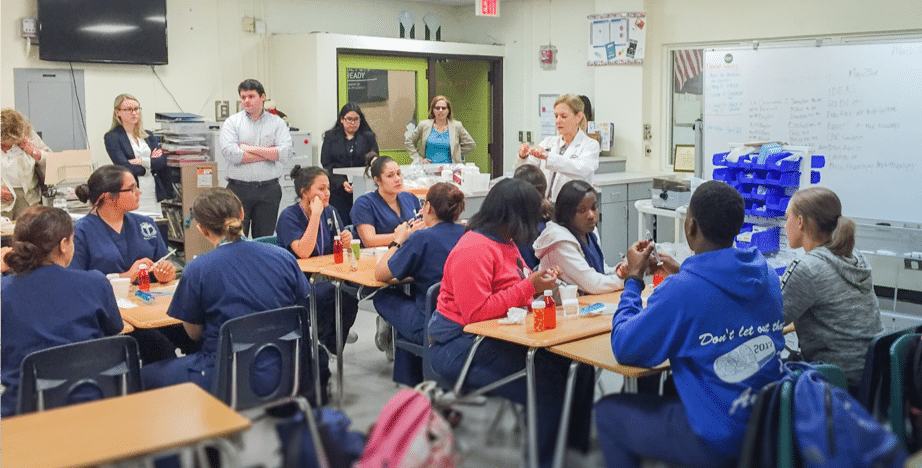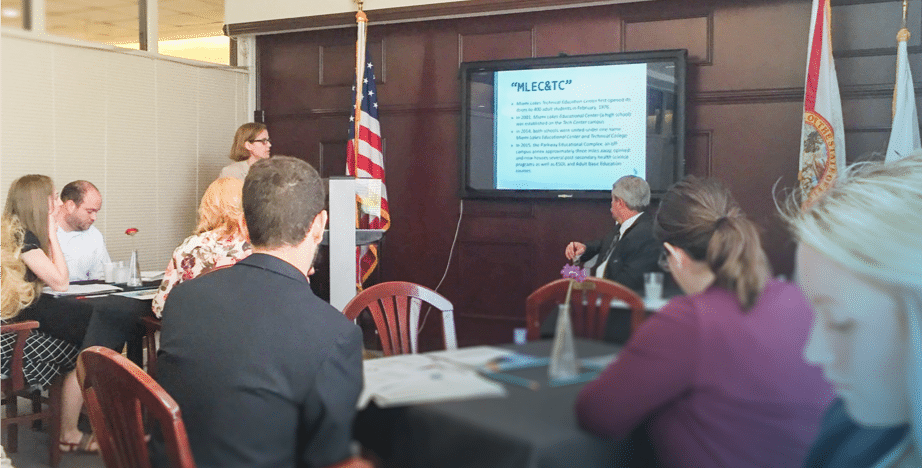Overview
Slides from the follow-up webinar to this trip can be found here»
This field trip, a collaboration between AYPF and the Data Quality Campaign, was focused on how cross-system collaboration (through a P16/P20 council or similar mechanism) can best align state-level efforts to ensure that all students become productive citizens that are prepared for and succeed in postsecondary education and the workplace. The trip showcased Georgia’s efforts through their Alliance of Agency Heads (P16 Council), work with the College and Career Readiness Policy Institute, successful Race to the Top bid, and data alignment. State teams both heard and saw Georgia’s efforts, but were also given an opportunity to engage in discussion within and across our invited state teams.
Our agenda included:
- Understanding the P16/P20 structure (and the policy environment in Georgia, as necessary)
- Discussion of policies that enhance college and career readiness and outcomes through collaboration
- Sessions related to how data sharing can help achieve your P16/P20 goals
- Discussion of the role of business and advocacy groups to support this cross-system collaboration
- Activities to assess participating states’ current capacities and areas for improvement
- Site Visits
- Early College High School
- K12/Higher Ed collaborative workforce development/training program
The Georgia Alliance of Education Agency Heads, Georgia’s P-20 council, is a collaborative of key senior staff from all 7 education agencies and representatives from the Governor’s Office of Planning and Budget, Georgia’s Workforce Investment Board, Governor’s Office of Workforce Development, Georgia Partnership for Excellence in Education, Metro Atlanta Chamber of Commerce, Georgia Chamber of Commerce, Georgia Public Broadcasting , and Georgia Leadership Institute for School Improvement. The Alliance was established in 1995.
The five goals of the Alliance are:
- Increase high school graduation rate, decrease high school drop-out rate, and increase post-secondary enrollment rate and success.
- Strengthen teacher quality, recruitment, and retention.
- Improve workforce readiness skills.
- Develop strong education leaders, particularly at the building level.
- Improve the SAT/ACT scores of Georgia students.
More on the Alliance of Education Agency Heads»
Initiatives of Georgia’s Alliance of Education Agency Heads»
ABOUT GEORGIA WORK READY
Georgia Work Ready was launched in August 2006 by then Governor Sonny Perdue and the Georgia Chamber of Commerce to improve the job training and marketability of Georgia’s workforce and drive future economic growth for the state. It is the only initiative of its kind to be conducted through a partnership between a state government and state chamber of commerce, ensuring that companies can more reliably match the right people with the right jobs. The Georgia State Workforce Investment Board oversees the implementation of its strategic plan through Georgia Work Ready.
The Work Ready certificate shows that an individual has certain fundamental skills needed in the workplace. The WorkKeys assessment system (developed by ACT) is used to determine those skill levels. The Georgia Work-Ready Certificate verifies an individual’s work readiness skill level to potential employers and demonstrates the individual’s commitment to success. The assessment is free and offered in every county; training courses are also free. High school students can earn a certificate in their senior year; non- HS students must be at least 18 years old or in a GED program and 17 years old.
WorkKeys identifies skills needed on the job, assesses an individual’s skill level, and helps identify training needed to close any gaps. The core skills measured include applied mathematics, reading for information and locating information. The work habits assessment measures work-related attitudes and behaviors in areas that are trainable and coachable, such as carefulness, cooperation, discipline and drive.
The Work-Ready Certificate levels:
- Bronze indicates a minimum score of three in all three core areas
- Silver indicates a minimum score of four in all three areas
- Gold indicates a minimum score of five in all three areas
- Platinum, offered only in the state of Georgia, indicates a minimum score of six in all three core areas and signals to employers that you are ready for 95 percent of jobs in the state.
Work-Ready Regions in Georgia are focused on the state’s fastest-growing industries: aerospace, advanced communications, advanced manufacturing, bioscience, engineering, and logistics. The regions focus on educating the emerging workforce (HS students, technical and college students) in these industries, as well as the existing workforce and transitioning workforce. Each region has an industry leader and a regional industry network. Georgia has developed career pathways for each Work-Ready Region, developed by the regional industry networks.
SITE VISITS:
Central Education Center, Coweta County
The Central Education Center (CEC), a publicly funded charter school, opened in August 2000. CEC serves grades 9 through 12. CEC connects East Coweta High School, Newnan High School, Northgate High School, West Central Technical College and local businesses. Students attend voluntarily from the county’s three high schools for all or part of every school day.
The objective of CEC is to combine academics and career and technical education; secondary and post secondary; and education and careers. They attempt to match curriculum with career expectations. An example of how academics and careers are linked is that students earn a “work ethic” grade in every class in addition to course grades. CEC works with over 100 local businesses to provide students with work-based learning experiences such as internships, and apprenticeships. CEC has a dual enrollment program that allows high school students to earn college certifications through West Central Technical College. CEC also offers programs for adult learners in Technical College and GED-preparatory courses. In addition, CEC provides local corporations with customized training through the West Central Technical College.
In conjunction with the West Central Technical College, the CEC offers courses in the following areas: Automotive, Aviation, Business, Business of the Arts, Communications Technology, Construction Technology, Cosmetology, Criminal Justice, Culinary, Drafting, Education and Teaching, Graphic Communications, Health Sciences, Horticulture and Biotechnology, HVAC, Information Technology, Pre-Engineering/ Robotics, and Welding, as well as work-based learning opportunities.
In 2004, CEC was recognized as a national Model High School by a consortium of professional education organizations including the International Center for Leadership in Education (ICLE), the Council of Chief State School Officers (CCSSO), High Schools that Work, and many others. The Central Education Center model has been replicated throughout Georgia.
Carver Early College High School, Atlanta Public Schools
In 2005, Carver Comprehensive High School reopened as The New Schools at Carver. Carver Early College High School (CEC) is one of five small schools located within The New Schools at Carver. The other small schools are Carver School of the Arts, Carver School of Health, Sciences and Research, and the Carver School of Technology. Carver Early College serves students in grades 9 through 12.
Prior to reform, Carver was the district’s lowest performing high school; in 2002, Carver’s graduation rate was 14.4 percent. In 2009, the combined graduation rate for the small schools was 94 percent. In 2009, CEC graduated their first high school class. The class of 2009 had 79 students, and boasted a graduation rate of 100 percent. All graduating students in 2009 had been accepted to at least one two-year or four-year postsecondary institution. The Carver Early College population consists of 100 percent minority students, 82 percent of whom are first-generation college students.
Through a partnership with Georgia State University Carver Early College offers a dual enrollment program. Through the dual enrollment program, 11th and 12th grade students, as well as some 10th grade students are able to complete up to sixty hours of college credit, which is the equivalent of two years of college or an associate’s degree, through Georgia State University, while still in high school.
Carver Early College was the first of 12 early college high schools now open in Georgia. The Georgia Early College Initiative is a partnership between the Georgia Department of Education and the University System of Georgia. Early College is an intervention strategy for students who may not be well served by traditional high schools. The initiative also seeks to change the face of higher education by targeting those students traditionally underrepresented on college campuses.
STATE P-16/P-20 GOVERNANCE DOCUMENTS
- Arizona Exectuive Order
- Colorado Executive Order
- Connecticut Executive Order
- Delaware P-20 Bylaws
- Maryland Executive Order
- Minnesota Bylaws
- Montana Resolution
- New Mexico Legislation
- Nevada Statute
- Virginia Statute
- Vermont Legislation
State College and Career Ready Fact Sheets (provided by Achieve)
- DC CCR Fact Sheet
- Georgia CCR Fact Sheet
- Illinois CCR Fact Sheet
- Maryland CCR Fact Sheet
- Missouri CCR Fact Sheet
- Nevada CCR Fact Sheet
Achieve Resources
Data Quality Campaign – We encourage you to read:
The analysis of your state’s essential elements and actions
Postsecondary issue page:
Workforce issue page:
- http://dataqualitycampaign.org/build/issues/Workforce
- http://www.dataqualitycampaign.org/resources/details/925
Building and Using State Early Childhood Education Data Systems
State Action 3: Data Governance
Using Linked Data to Drive Education and Training Improvement:
Atlanta, Georgia
CLICK HERE TO VIEW THE AGENDA FOR THIS TRIP»
Click here to view a full and updated list of this trip’s participants»
Recommended Resources
- The Promise of Pre-K in Georgia
- Georgia Partnership for Excellence in Education
- Top Ten Issues to Watch in 2011
- Economics of Education
- Pathways to Prosperity Report
Contact Information
Andrea Browning
Senior Program Associate
American Youth Policy Forum
1836 Jefferson Pl NW
Washington DC 20036
202.775.9731
abrowning@aypf.org
Jennifer Brown Lerner
Senior Director
American Youth Policy Forum
1836 Jefferson Pl NW
Washington DC 20036
202.775.9731
jlerner@aypf.org




